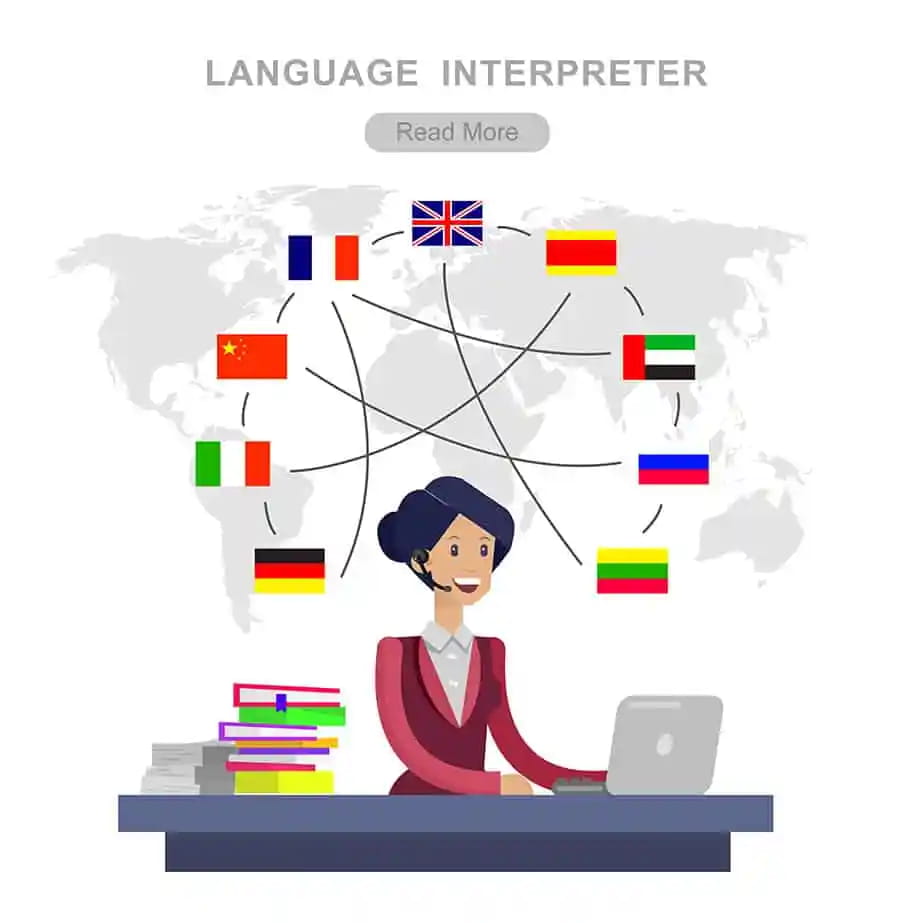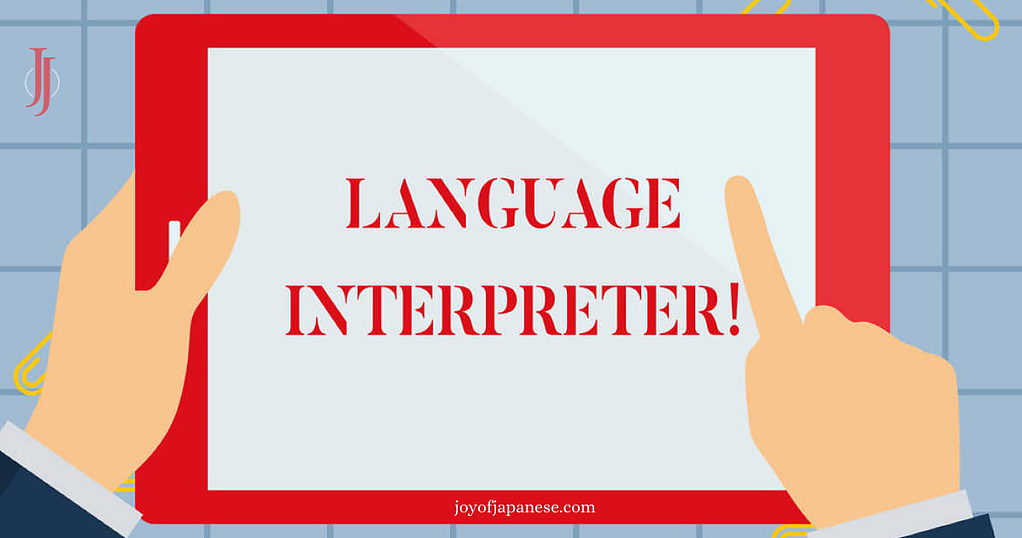A career as an interpreter is one of the most sought-after careers involving Japanese.
And why not?
Few speak Japanese as a second, third, or foreign language than popular European languages or Mandarin.
Japan’s thriving economy, leadership in exports, work culture, and outlook on human relations make careers for Japanese learners a good choice. As a result, Japanese skills are in demand, and more career choices exist.
Being a Japanese interpreter is a lucrative career opportunity. It offers plenty of advantages with promising job prospects and good earnings. To sum up, it is a rewarding employment choice!
It’s no surprise that working as an interpreter is a favored career option for many Japanese learners and an increasing number of people with a flair for foreign languages.
If you are learning Japanese and aim to become a Japanese interpreter, you are in the right place.
This ultimate guide covers everything about a career as a Japanese interpreter. It includes, but is not limited to, requirements, job types, opportunities, salary, benefits, and drawbacks.
Time to get started!
TABLE OF CONTENTS
- What does a Japanese interpreter do?
- How is an interpreter different from a translator?
- Types of Japanese Interpretation Jobs
- (i) Simultaneous interpreting
- (ii) Consecutive interpreting
- (iii) Chuchotage or Whispered interpreting
- (iv) Telephone Interpreting (OPI or over the phone)
- (v) Travel interpretation
- (vi) Bidule interpreting
- (vii) Liaison interpreting
- (viii) Relay interpretation
- (ix) Business or negotiation interpreting
- Benefits of Japanese Interpreter
- Disadvantages of Japanese Interpreter
- How do you become an interpreter in 2025? — Requirements
- How much time does it take to become an interpreter?
- How much does a Japanese interpreter make? — Salary
- Job choices and where to find them?
- Final Words on Career As a Japanese Interpreter
What does a Japanese interpreter do?

A Japanese interpreter is a professional with excellent speaking skills who is fearless of getting up close to work in real-time. They aim to ease communication between native and non-Japanese speakers.
Interpreters ensure that the original message’s intent is conveyed as it is. Plus, it also takes cultural nuances and faux pas into account.
Japanese interpreters work in various settings, setups, and surroundings, such as government bodies, international organizations, private companies, agencies, and freelancers.
The candidates are highly skilled in both Japanese and the target language. Excellent interpreting and communication skills, a clear voice, and confidence matter greatly.
Some interpreters have specialized knowledge or experience in specific industries, such as law, finance, health, engineering, and science.
As an interpreter, you can travel and understand cultures. You discover more about Japan’s outstanding foods, arts, customs, festivals, traditions, and history. Also, you learn through Japanese anime and entertainment.
You will work for customers in the business, several sectors, and other disciplines. You can operate as a full-time employee, part-time staff, or freelancer.
Among your responsibilities is converting conversational content to another language. This makes subtitles for TV and internet media and uses online interpretation tools.
How is an interpreter different from a translator?
An interpreter is a trained professional who converts spoken from the source to the target language in real time.
In contrast, a career as a Japanese translator requires a person to translate written text from one language to another.
In short, interpreting is for spoken communication, while translation is for written text.
Interpreting demands a high level of fluency in two languages. You also need to think and convey meaning in near-real time as it is.
One can translate slowly and refer to other sources and materials. Plus, you do not need to be perfect in the target language as the work isn’t instant. Hence, this makes it easier than interpretation.
Interpretation between two or several individuals can be stressful and fast-paced. Yet, the fields of translation and interpretation often overlap and require similar skills.
Types of Japanese Interpretation Jobs
There has been a constant change of ways and scope of interpretation. The need also varies depending on the organization.
Today, there are different interpretations of works. Here are the 9 widespread forms of Japanese interpreting.

(i) Simultaneous interpreting
Simultaneous interpreting is used for significant events, meetings, and conferences with many attendees. Here, the interpreter translates the orator’s words in real-time while listening and comprehending the sentences.
This is still not live, as there are a few seconds of delays. This is because the interpreters can only interpret once they understand the entire meaning of the text.
Because of the work’s nature, this interpretation is demanding and decisive. So, they are always on edge and active throughout the task.
There is a risk that the speaker may lose a few words (and possibly an entire thought or sentence) if there is a delay. So, there is no scope for sloppiness and incompetency.
(ii) Consecutive interpreting
This second form a back-and-forth style of interpreting. This is often operated in short-duration news conferences, courts, and business meetings.
Here, interpreters stand near the presenter to deliver consecutive interpretations. The speaker speaks in their native tongue and usually stops after every 1–5 minutes.
This is typically the last sentence of every topic, opinion, and paragraph. While the interpreter listens, they remain silent for a few sentences and then restate what was said in the target language.
Taking notes is crucial in this form of interpreting. Only some people can memorize an entire paragraph without losing details in one hearing.
(iii) Chuchotage or Whispered interpreting
In whispered interpreting, the interpreter listens and analyzes the message before whispering it to the customer quietly. Then, the interpreter conveys the message in the client’s preferred language.
Chuchotage is like simultaneous interpreting but with the same difficulty level and stress. As a Japanese interpreter, you will hear, understand, translate, and give the speech synchronously in the target language.
This method is suitable for smaller meetings with fewer participants because of the essence of the work and low voice. However, it will not work for large-scale events like conferences with hundreds of attendees.
(iv) Telephone Interpreting (OPI or over the phone)
There are two types of scheduled telephone interpreting: simultaneous and consecutive. The interpreter does not see the parties in person but interprets over the telephone during an established appointment.
Telephone interpreting can be conducted in parallel if participants are happy to hear only the interpreter’s voice. Otherwise, interpreting back-to-back is a better option.
However, there are certain shortcomings. For instance, interpreters need to be more accurate since they do not see speakers and their body language. They also don’t have access to non-linguistic hints for meaning and context.
(v) Travel interpretation
A travel interpreter is like a linguist tour guide but requires more fluency, accuracy, and awareness of a cultural perspective.
Interpreters escort customers and tourists to their agreed-upon places and help them overcome language obstacles. In addition to language, interpreters need to know local customs and the destination where a client travels.
A travel interpreter is not just an interpreter. It acts as a cultural liaison, booking taxis and hotels, ordering food, and even closing multi-million dollar business deals.
(vi) Bidule interpreting
Bidule interpreting is a portable receiver and transmitter system. This enables simultaneous translation without the use of a cabin.
They use a microphone to translate the words speakers speak into another language using the transmitter. The audience listens to the translation using headphones.
This is only suitable for small groups, tours, and less formal occasions like seminars and corporate stays. It has many benefits, such as being easy to use, requiring no specialized technicians, being easy to carry, and being low-cost.
(vii) Liaison interpreting
This is another mode of interpretation that does not require note‑taking and is performed two-way. This aspect of Japanese language interpreting is also pretty common.
Liaison interpreting is an informal manner of interpreting between people or organizations. This is less accurate than consecutive interpretation, and word-to-word interpretation is unnecessary here.
(viii) Relay interpretation
Relay interpretation is your best option if you cannot find an interpreter for a specific language pair. Multi-interpreter services are provided under this type.
For example, you may need an interpreter to translate French into Latvian. But due to the absence of a less-spoken Latvian interpreter, you would go for a common language like English. So, the final result will be French, English, and Latvian.
Of course, this is lengthy and more expensive. But sometimes, because an interpreter in a specific language pair is unavailable, this is the only way to complete critical work.
(ix) Business or negotiation interpreting
There is a negotiation interpretation where it promotes communication in commercial negotiations. This works in talks with a small group of people.
Ideally, an interpreter must have experience participating in such talks, as well as the skills and enough time to prepare.
Benefits of Japanese Interpreter
There are many benefits of studying Japanese when working as an interpreter. Some of them are:

(i) Japan’s prosperous economy
Japan is a diverse, booming, and innovative country. It is not just one of the world’s biggest tech centres but thriving in many fields, such as fishing, tourism, animation, finance, entertainment, and manufacturing.
This can facilitate communication between Japanese and non-Japanese speakers.
It also allows for more efficient and effective communication in various settings, such as business meetings, medical appointments, and legal proceedings.
So, even in highly particular areas of expertise, a Japanese interpreter will find many job possibilities. Of course, some positions are demanding and have varied needs. But they are highly worthwhile and pay reasonably.
A Japanese interpreter can help bridge cultural gaps and promote understanding between different groups of people and organizations.
(ii) Growing demand for interpreters
Japan’s booming economy and global influence require interpreters for Japanese and international businesses.
This is clear as Japan is developing beyond national borders and into international markets. This is one of the advantages of studying in Japan.
Similarly, foreigners also require interpreters to reach the Japanese market.
And the best part is that only some Japanese-speaking people are involved in this sector. This can be attributed to two reasons.
First, Japanese citizens have a lower understanding of English than the rest of the world.
Second, most documents have already been translated from Japanese to English; they need personnel who can interpret the articles from English into their original languages.
Most Japanese people need help to shed their Japanese accent while speaking English.
In contrast, it is more straightforward for a foreigner to sound more Japanese with enough practice. This means foreigners have a higher demand in the interpretation market.
In summary, there is a high demand for interpreters in many fields, such as healthcare, legal, and business. As global communication and travel continue to increase, the need for interpreters will also grow.
(iii) Broaden your horizon
Learning a new language widens one’s human experience. To do the job well, an interpreter must be thoroughly familiar with the source and target languages and the country where the language is spoken.
A translator, interpreter, or localizer’s thorough awareness of the cultures involved guides them through the most complex aspects and motivates them to provide authentic and striking results.
Japanese Interpreters do not always learn by working alone. Linguists may attend international events, conferences, and courses to improve their abilities and network with other experts.
(iv) Flexibility
Career prospects in Japanese as an interpreter are indeed a world of possibilities.
Interpreters have a wide range of work options. Owing to the internet, one’s professional world is no longer limited to the city, state, region, or nation in which one resides.
Beyond working full-time for various organizations, you can explore part-time options. Of course, you could always explore ideas like getting freelance employment, which is a great place to start.
(v) Japanese interpreters make good money
Japanese interpreting can be well-paying, with high salaries and incentives. This is mainly for those with specialized skills and experience in a specific field or industry.
It’s vital to mention that earning prospects for interpreters can vary widely. They depend on the sector, references, locations, domain-specific knowledge, and experience level.
On average, a Japanese interpreter earns more than other language-related work. Some interpreters working in specialized fields or with vast experience may make even more money.
Besides being full-time employees, many also work as freelancers. They are paid hourly or project-wise, which is usually lucrative. In that case, they have more flexibility and good wages, but jobs are also unstable.
Disadvantages of Japanese Interpreter
Like anything else, there are some drawbacks linked to Japanese interpreters. A few of them are listed below.

(i) Limited subject expertise
An interpreter may need more expertise in various fields, such as medicine, the law, tech, or engineering. Unfortunately, this could lead to mistakes, inaccuracies, and misinterpretations.
A significant industry or area of knowledge is required. This is because particular wisdom is often needed to determine goals and priorities within a project correctly.
This may sound like a dream come true for some, but remember that this isn’t only about J-pop or animation news. Besides knowing about politics, history, and technology, you should also be familiar with other fields.
You need to be aware of the cultural context most of the time. For example, Japan’s customs are rich and complex, and an interpreter may need help comprehending them. This can lead to misinterpretations.
Offering a high-quality interpretation service demands understanding a specific trade, market, and field. Thus, skilled interpreters are always in high demand and well compensated.
(ii) Requires near-native Japanese proficiency
As a Japanese learner, you realize how much knowledge you need to achieve meaningful fluency in this language.
Considering Japanese is difficult, you need advanced abilities like JLPT N1 or NAT-TEST Q1. There must be more than an intermediate level to excel in this field.
If you’ve been looking forward to the day when you can stop studying, learning, and researching, this is not for you.
Beyond studying Japanese throughout your career, you’ll also need to stay updated on everything happening in Japan.
Another weakness is the limited ability to convey tone and emotion.
Interpreting spoken needs the ability to convey sound and feeling, which can be challenging for some interpreters. Also, nonverbal cues, like body language and facial expressions, can be complex to interpret and convey.
(iii) Interpreting jobs are exhausting
This is a job that requires complete focus during work. You also must spend hours and days reading and understanding the work, field, and purpose.
This can be pressing and mentally taxing. It needs constant listening, understanding, and conveying information in multiple languages.
You may also need to work long hours, often in high-pressure or stressful situations, which can lead to mental and physical strain. So, it may tire after long interpreting periods, leading to incorrect information or misunderstandings.
This can also be tricky, as professional interpreters may have to deal with a sensitive or complex subject.
(iv) Interpretation jobs are often unstable
Interpreter jobs can vary in terms of stability, depending on many factors.
Some interpreter jobs, such as those in government or large corporations, may be more stable and offer more uniform work.
Other jobs, like those in the freelance or contract-based sector, may be less stable and offer varying employment levels. Unfortunately, a long period of no work is standard and expected in this field.
Freelance interpreters often need help finding consistent work and may have to look for new clients and opportunities constantly. Further, freelancers may have to deal with irregular pay and a lack of extra benefits and perks.
Job stability can vary widely depending on the specific position and industry. So, it’s always a good idea to research the job market and potential employers before pursuing a career as an interpreter.
How do you become an interpreter in 2025? — Requirements

To become a successful Japanese interpreter, you need to fulfill some requirements. Here are some of the essential ones.
1. Fluency in Japanese and another language
To work as a Japanese interpreter, one must have a high level of fluency in Japanese and another language (E.g., English or your mother tongue). This includes the ability to speak, read, and write in both languages at a professional level.
Interpretation demands more than intermediate-level skills. So, enroll for long-term Japanese courses at private institutes, universities, or through a teacher.
Immersion in the language is one of the quickest methods to improve your language abilities and become a Japanese interpreter. So, you can watch films, listen to songs, and enjoy J-pop to improve your Japanese.
This can also help you engage, exchange, enhance, and immerse yourself in the language.
In most scenarios, the job would involve on-the-spot translation, interpretation thinking, and communication. Your Japanese skills must be their best since you have to speak almost like a native speaker.
Some organizations may require interpreters to be certified by official or recognized institutions. Therefore, university diplomas, degrees, or international certifications like the Japanese language NAT-Test or JLPT can improve job prospects.
2. Experience in the same field
Most interpreters need experience in the same field to be hired as interpreters. Internships are an incredible way to gain work experience.
Some companies offer paid or unpaid internships so that you can put what you have learned into practice.
Getting experience through volunteer work is another option. Although you won’t be paid, you will gain valuable experience that can help your resume.
3. Cultural knowledge and domain expertise
Beyond language talents, a good understanding of Japanese culture, practices, and etiquette is essential. This is vital, particularly when interpreting a language and culture different from one’s own.
You can also listen to podcasts and music. Plus, you can enjoy anime, movies, and TV shows to learn Japanese to enhance your skills.

Good insight into a field-specific topic, such as healthcare, law, or business, is vital for interpreting. This avoids miscommunications and misinterpretations.
Understanding Japanese traditions and customs would also help. J-movies for learners can also help. They enable you to negotiate social settings more effectively and will benefit on-site translation work.
4. Interpreting skills and Professionalism
Interpreting demands specific skills, such as conveying tone and emotion. It also accurately represents idiomatic expressions and provides nonverbal communication.
They should be professional, reliable, and able to maintain confidentiality.
You may be familiar with modern technologies like telephone interpreting, videoconferencing, remote interpreting software, or AI-powered language tools.
The most important aspect is how to use Japanese materials. Familiarizing oneself with the research skills required for translation takes time and effort.
It would help if you also have time management skills, patience, active listening, confidence, self-motivation, adaptability, and integrity.
Accurately searching for stuff you don’t know is crucial when starting, mainly after you perform professional work.
Interpreters may have to work in various settings and adapt to different cultures, environments, and subjects. Therefore, candidates should be in good physical and mental health.
How much time does it take to become an interpreter?
Becoming a successful Japanese interpreter requires a near-native level of Japanese. This typically takes several years of dedicated study and practice.
The time to learn Japanese depends on many factors. Your learning style, approach, mother tongue, dedication, and time spent can influence the duration.
According to studies by the FSI (Foreign Service Institute of the USA government), Japanese is part of a “Super-hard language.” To summarize, it is among the hardest languages to learn.
They estimate that it will take 88 weeks, or 2200 instruction hours, to become fluent in Japanese. Once we add 1:1 self-study and classroom sessions, the total study time increases to 4,400 hours.
Usually, it takes 3–5 years to achieve advanced abilities like the JLPT N1 or Q1 of the NAT test. You can also pursue a bachelor’s and then a master’s degree in Japanese from a university to become a professional Japanese interpreter.
It takes several years of study at a college or private institute, as well as professional training and certification. Thus, ongoing practice and continuing education are crucial for maintaining current skills.
Once you achieve advanced fluency, equal to almost native, you can kick off your career in Japanese and become an interpreter.
Beyond your Japanese skills, you also need a high level of competence in English, your native tongue, or another language. Plus, it would help if you deeply understood the cultures and industries they will be interpreting.
How much does a Japanese interpreter make? — Salary
The salary of a Japanese interpreter can vary widely. It depends on many factors, such as industry, profile, location, and experience level.
According to data from PayScale, the average salary for a Japanese interpreter in the USA is about $50,000 per year. In general, it ranges from $30,000 to $80,000.
This can be higher or lower depending on elements like the specific sector you are working in. For instance, legal, technical, or medical interpreting may pay more than generic interpreting.
The location and experience can boost your paycheck. Plus, Japanese interpreters with specialized skills or certifications may command higher salaries.
In India, the salary for an N3/N2 graduate with industrial experience (mainly software) for interpreting begins at around 40K monthly.
Even for freshers with N3 certification, the starting compensation is about 30-35k, which is more than the software sector. Yet, as you gain more experience and fluency, it can go close to 7-figure per annum.
The average annual pay for an interpreter in Japan is roughly 4,500,000 to 5,00,000 yen. (approximately INR 2.5 to 3 million).
Job choices and where to find them?
Once you achieve higher language abilities, start looking for options as a Japanese interpreter. You have many choices.
Besides contacting companies and job portals, you can join many interpreter communities. This is a virtual place where interpreters meet. You can discuss careers, available opportunities, and related topics.

(i) Government and international organizations
Every government needs someone to interpret papers and attend meetings. This is to interact and build ties with governments worldwide.
The government hires interpreters for various purposes. E.g., you may translate papers or audio recordings for such jobs. You can also get the option to serve as an on-site interpreter at meetings and events.
International organizations exist at the local, national, and global levels. For example, the UN, the Asia-Pacific Economic Cooperation, and embassies have employment openings.
(ii) Japanese companies and Private sector
You can work in one of the hundred Japanese companies spread across the globe. Also, you can try job portals and networking sites like LinkedIn.
You can also choose small, mid, and large corporations, both commercial and industrial. Many MNCs have footprints in Japan or are firms that deal with Japan.
To offer products and services outside, every firm requires someone to interpret paperwork.
This business is enormous. Its human resources include people who handle interpretation. They might outsource their work to a third-party agency.
(iii) Agencies and Interpretation Businesses
You might be especially interested in this one if you want to become an expert in interpretation.
Translation and interpretation agencies provide translation services to other companies or individuals. They’re created by teams of experienced Japanese experts who work in several languages.
You can work for a language-related service firm.
(iv) Project-oriented (Freelance)
You should seek this position if you are an experienced interpreter.
Like the rest of the globe, Japan appreciates freelancers’ freedom. Therefore, there is a high demand for this type of employee today.
There is a high demand for whatever interpretation job you seek in Japan and elsewhere. This is because of the massive commerce moving in and out of the country.
As a result, many companies are always looking for Japanese interpreters. Due to the language’s complexity, competition could be less and better for candidates.
(v) Academic center and events
If you want to gain interpretation experience, consider volunteering as an interpreter. You can do it at local comic and anime festivals and Japan-related events.
Even if you don’t get paid, you may add it to your CV and gain more everyday experience than rushing into business meetings.
The university’s Japanese department or language school can be placed to find requests for interpreters. So you can get yourself out there if you feel ready and your teachers agree.
(vi) Japan
Due to Japan’s aging population, Japanese businesses always look for talented foreign workers. That is why Japan has collaborations and MoUs with many countries, including India.
The association allows many qualified foreign employees to work in Japan. This is a costly operation, but there are methods to reduce the cost.
Getting a job in Japan is one of the most incredible options. The caveat is that you must pass one of the Japanese Language Proficiency Tests at a certain level to boost your chances.
Various initiatives exist to recruit native English speakers to teach throughout Asia. For example, working as an ESL teacher in Japan, improving and searching for jobs as an interpreter with English as a primary language.
The pay is typically low, but it allows you to immerse yourself in the language and gain a once-lifetime experience.
Final Words on Career As a Japanese Interpreter

To work as a Japanese interpreter, you must first be fluent in Japanese and everyday situations. You also need a firm command of another language, English or your mother tongue.
Besides solid speaking and listening skills, you must read and write well since the work could relate to formal matters. So, as in the textbooks, those who studied the standard form have an edge.
You could enroll and learn Japanese at learning centers or through a teacher. You can also use podcasts, books, audio and video lessons, and Japanese language apps.
Being a Japanese interpreter offers many avenues for exploration and benefits for your career and personal growth. It is also a high-demand, well-paying job, making it a great career opportunity.
The journey to becoming a Japanese interpreter is long. It isn’t easy, and it won’t happen right away. But it is worth it! Your dreams can become a reality with careful planning and hard work!
So, what are you waiting for? Learn Japanese, speak fluently, and have a once-in-a-lifetime opportunity to make a great career in Japanese.
Thank you for reading this article. I hope you found it interesting. Please share your thoughts in the comments.












Hello Vikas, Thank you sharing your expertise about this beautiful language. I am working as an interpreter for some other languages, however I really want to start interpreting Japanese too. Could you kindly point me too any institute that provides training for the same. Thank you again for sharing helpful resources. Thanks. Best regards.
I am not sure about any specific course designed for interpretation. However, if you get mastery like JLPT N1, and get some working experience, you can get good opportunities.